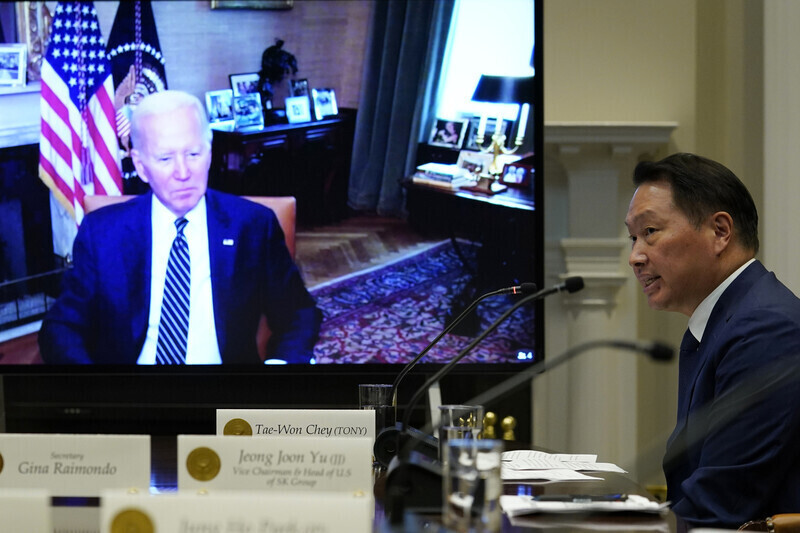Korean chipmakers caught between US investment, Chinese market
A bill recently passed by the US Congress could have negative consequences for Samsung Electronics and SK Hynix, both of which have plants in China

US President Joe Biden (appearing via video conference on the screen on the left) speaks with SK Group Chairperson Chey Tae-won during Chey’s visit to the White House on July 26. (Reuters/Yonhap News)
Domestic chip companies such as Samsung Electronics and SK Hynix are mulling how to navigate South Korea’s potential participation in Chip 4, a US-led semiconductor partnership; the intensification of US export restrictions on chipmaking gear against China; and the CHIPS and Science Act, which was recently passed by the US Congress. This is because these companies have to simultaneously consider the Chinese market in the present and the expansion of investment in the semiconductor industry as well as semiconductor technology development in the future.
According to Bloomberg and other foreign media on Sunday, the US Department of Commerce recently sent all chipmaking gear companies within the US an official letter barring them from exporting gear for fabricating chips of 14 nanometers or thinner to China. Earlier, the US government had made the same request to the Dutch chip company ASML and Japan’s Nikon. In other words, US attempts to hold the Chinese semiconductor industry in check are intensifying.
The CHIPS and Science Act, the US House of Representatives passed on Thursday, also included clauses restricting chip companies across the world from making investments in China. The bill expressly stated that companies receiving US government support cannot invest in the development and production of cutting-edge semiconductors in specific countries that may threaten US security.
A semiconductor industry insider said, “[The bill] can only be interpreted as intended to restrict investment in China. Of course, the criteria for ‘cutting-edge semiconductors’ has not been determined yet.”
Samsung Electronics revealed earlier that it will invest 250 trillion won in Texas over the next 20 years to build 11 chip factories in the state. Chey Tae-won, chairman of SK Group, also promised 29 trillion won in investment to the US during a recent meeting with US President Joe Biden.
Samsung Electronics manufactures NAND flash memory devices in Xi’an and Suzhou, both in China, while SK Hynix mainly manufactures DRAM devices in Wuxi, Chongqing, and Dalian. In other words, both companies may be negatively affected by the US’ CHIPS and Science Act.
On top of this, South Korea has to decide very soon whether it will be joining Chip 4, as requested by the US. China has repeatedly made clear that it opposes South Korea’s participation in the partnership — hence the impasse faced by the South Korean semiconductor industry as a whole.
An industry insider who spoke on the condition of anonymity said, “It’s hard for companies to state their stance, as the issue concerns foreign policy as well as security.” They continued, “We can neither lose China, which makes up about half of the total demand for chips in the world, nor ignore the US’ demand, considering that we need to import equipment from the US in order to achieve technological development.”
Chey’s statement that “specifics regarding what the Chip 4 alliance will be doing in particular have not been revealed” and that he believes “the issues will be properly dealt with by governments and others when the details have been set” during his recent visit to the US seems to have stemmed from the difficult situation corporations are finding themselves in.
“For now, all we can do is wait for the government to respond wisely,” another semiconductor industry insider said.
Seoul is also reportedly weighing its options. A government official commented, “Foreign policy experts say we should join [Chip 4], while economics experts say we should be cautious.”
“If we don’t join Chip 4, it would be hard to receive stable supplies of chipmaking gear and materials,” Park Jea-gun, professor of electronic engineering at Hanyang University and the president of the Korean Society of Semiconductor & Display Technology, commented. “We should join the partnership but at the same time [negotiate well] so that chip factories run by South Korean companies in China can receive cutting-edge chipmaking gear and materials.”
By Lee Jeong-hun, staff reporter; Bae Ji-hyun, staff reporter
Please direct questions or comments to [english@hani.co.kr]